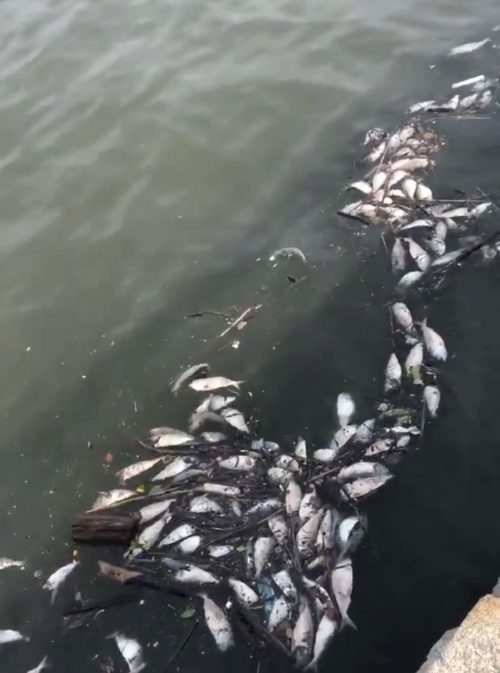
Hudson River Fish Die-Off Was Exacerbated by Climate Change, Scientist Says by Carol Tannenhauser
Did anyone notice the dead fish floating all along the Manhattan shore of the Hudson River on the 4th of July weekend? It is another glimpse of the new normal in our rapidly-warming world: a substantial fish die-off in the Hudson barely receives attention. Days of dead fish for miles, almost all of one species—Atlantic menhaden, also known as bunker fish—were to be seen floating in the tide. The cormorants and seagulls were not interested—I thought they must already have gorged themselves on these fresh-dead fish to pass them up—yet an odd sense settled in that the seabirds’ instincts told them to leave those fish be. Every now and again, a fish could be seen swimming on its side, swimming in a tight circle, in its death throes. It was a horrifying sight, juxtaposed with people enjoying a sunny day on the waterfront.
The official word, hastily looked up and reflected on my phone on July 3rd was that the bunker, which swim in schools, must have hit a pocket of low-oxygen water and essentially suffocated en masse. Low oxygen is caused by climate change as the water warms, and by fertilizer runoff in the water, the resulting algae blooms consuming more of the oxygen fish need to survive. When water warms it holds less oxygen because its molecules are more kinetic than that of colder water. The fish die from hypoxia, a lack of oxygen. A ‘natural occurrence,’ it’s been known to happen, but apparently never as bad as this year. (I did see a dead eel and what I think was a striped bass as well, but the others were uniformly Atlantic menhaden.) Some were headless, but some were completely intact, reflecting a continuing scenario—one in which it took some fish longer to succumb.
What sources to turn to for information? New York State Department of Environmental Conservation, in contrast to the federal government, has taken an active role in reducing emissions and fighting climate change. I would have a healthy dose of skepticism in considering anything put forth by the gutted federal EPA in the current administration, after our withdrawal from the Paris Climate Agreement and alongside continuing, wrong-headed and confounding efforts to support the fossil fuel industry as though climate carnage was not a thing. New York State, referred to as a “subnational actor” in the UNEP Emissions Gap Report of November 2019, is among the states whose policies adhere to Paris Agreement levels of cutting emissions, regardless of the cynical federal retreat. Riverkeeper.org is the organization to which I turned for information in this very disturbing case of the impressive fish kill.
I first learned about Atlantic menhaden, bunker fish, in Montauk last year. On our annual camping trip to Montauk, we saw humpback whales spouting and jumping from where we stood on the beach. Bunker, we were told, travel in large schools and whales follow them. Never in a quarter century of summer visiting did we see whales from the beach. It, too, was an astounding sight, two whales jumping in graceful unison. We joked, slightly uneasily, that these were the End Times and evidence that the world is changing.
Jonathan Watts, summarizing UN findings in the Guardian in 2018, in which the headline 2 years ago blared: “We have 12 years to limit climate change catastrophe, warns UN” notes that in the most stringent, optimistic, best-case scenario, in which we limit ourselves to 1.5° C of climate increase, 1.5 metric tons of fish will die from ocean acidification and heating. An additional half-degree warmer would double the die-off to 3 metric tons. The specter of massive fish die-offs is suddenly imaginable.
At the 79th Street Boat Basin this summer, the usual sunset sight of the Clearwater Sloop docking and dispersing its groups of happy passengers is missing due to the pandemic. People traditionally set sail on the Clearwater for a several-hour tour to learn of the Hudson River’s ecology, the restorative cleanup of toxic PCBs from the 1970s, while enjoying the beautiful vistas of the Palisades and the Hudson itself. For those who remember the polluted years of the Hudson, it was a victory lap of sorts. I wish more people could see the sight of those dead fish, an unnatural alarm bell.
Riverkeeper notes that the Hudson is a delicate ecosystem. I worry that these ‘little’ signs, while explainable, are ominous. I’ve always known seagulls to be voracious feeders; even they seemed suspicious. Radical climate change is already upon us and we cannot become inured to the obvious. It is time to commit to action to preserve and to protect our ecosystems, not to shirk our responsibility. The Fourth of July scene on the Hudson must be a clarion call for the U.S. to recommit to the Paris Agreement.


